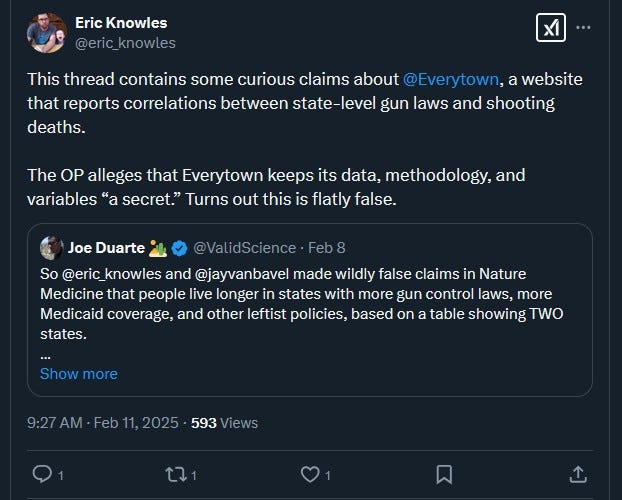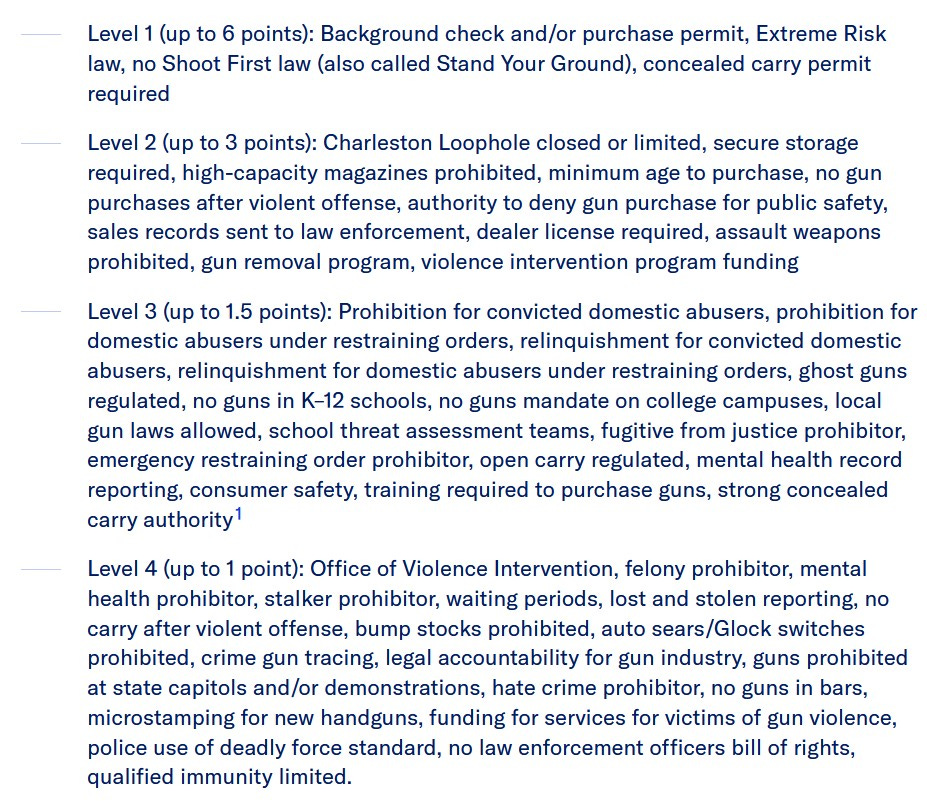Everytown is a leftist NGO founded by Michael Bloomberg that lobbies for gun control, including laws that disarm peaceful, non-criminal citizens.
They created a state-level Gun Law Strength index, and claim that states with better scores on this index have lower rates of “gun deaths”, or sometimes “gun violence”. They use both terms interchangeably, but their outcome variable is gun deaths, not gun violence — it’s all deaths from gunshots, including suicides and accidents. Most gun deaths are suicides — 58% in 2023, while 38% were murders, and ≈1% were accidents. (Everytown also includes legal self-defense shootings and police shootings. I suspect that when people read “gun violence” they think only of criminal violence, and that most uses of the word violence are understood as inherently criminal.)
Problems:
Their data is secret — they won’t release it.
Their variable construction is secret. They won’t release that either.
They offer no evidence that any of the laws they include in their index reduce “gun deaths” — whether suicides or murders by gun. That is, they have no apparent justification for including them.
They control for nothing in their correlation between their secret Gun Law Strength index and gun deaths. Not race nor any of the other known predictors of suicide and murder rates. Literally nothing – it’s a Pearson correlation.
Note that each of these problems by itself vacates their claims. There’s nothing we do with research of this quality, and since they won’t release their data we have no reason to assume it even exists.
I pointed to the first two issues above in a post on X. NYU social psychologist responded with this:
Strangely, nothing I said was false. (The false claims by Knowles and Van Bavel that I refer to in the X post are detailed in this report.)
Let’s start with the data. It’s secret. Everytown won’t release it. Knowles didn’t find it or anything. So his claim that my claim was false was itself blatantly false. (He does mention that Everytown says that they get their “gun deaths” data from the CDC, but I have no reason to care about what they say — they won’t release their data, that’s only their outcome variable anyway, and Knowles failed to notice something else.)
What about their methods? Everytown doesn’t disclose them, not to the extent that we’d be able to reproduce them, which is the standard in science. Knowles cites this text as falsifying my claim:
Okay, go reproduce their study and come back with your results.
You can’t do it, of course. What is this text? It’s a description of levels and point ranges, with various laws assigned to different levels. (From their website here.)
How many points does a state get if it has a Stand Your Ground law? No idea. The range is up to 6 points. Does it get 6? Or 5 or 4? What kind of law merits 3 or 5 or 2 points?
What does “mental health record reporting” mean specifically, and how does a state get 1.5 points instead of 1.0 points?
In fact, what do any of these things mean specifically? We have no idea. And what’s the scoring rubric? We have no idea. (A rubric would tell raters how many points to give to a particular law within the specified point range, e.g. some background check laws would count for 6 points, while others would count for 5 or 4 points. Their index method would still be invalid — I’m just noting that we have no idea what they did.)
And we can’t see what score Everytown gave each state on these criteria, or why. We can’t see anything.
So no, they didn’t describe their methods. Not to the standards of scientific research, which is that methods are described in sufficient detail that anyone can reproduce the research from the description. There’s nothing we can do with this.
An index of laws is invalid for demonstrating causal effects or even correlations because:
Laws aren’t commensurable units, nor do they have obvious mathematical/numeric assignments.
The choice of laws can be trivially rigged.
The rubric and rating system can be infinitely rigged.
Any real effects of a law are buried in a bucket of other laws, and it wouldn’t be clear what an effect for an index of dozens of laws meant.
Secret ratings + a secret method = we walk away. This isn’t anything, certainly not valid research.
Everytown could easily rig their index to get the results they want. For example, perhaps giving six points to Stand Your Ground laws and only one point to waiting periods helps get the correlation they want, whereas the doing reverse weakens the correlation. I strongly suspect that their scheme of placing different laws into four “levels” with different point ranges was engineered to get the correlation they want, and is fragile to any changes. Especially since they offer no explanation or theory for the four levels, the point ranges, the choice of laws, or the placement of specific laws in a given level.
“Gun deaths”
“Gun deaths” can fall while the suicide and murder rates stay the same, or even increase. Why? Because gun deaths isn’t composed of the suicide and murder rates — it’s composed of suicides and murders by gun. “Gun deaths” is a mindless variable that I suspect most people interpret as murders, perhaps visualizing school shootings.
It’s easy to be fooled by “deaths” and to not realize that with gun deaths, we don’t get:
The murder rate (just murders with guns, hiding any shift in methods)
The suicide rate (just suicides with guns, hiding any shift in methods)
Crime rates
Defensive uses of firearms (1.7 million per year according to English, 2021)
Any account of rapes, assaults, robberies, etc that were prevented by victims brandishing firearms, because they don’t go into this bucket of death
Moreover, the premise of this bucket of mostly suicides is that all those suicides should be prevented. It would never occur to me that it was my place to judge thousands of suicides, lives, and contexts I know nothing about. I don’t have a settled view of the ethics of suicide, but I’m sensitive to context and the possibility that someone’s suffering is horrendous, inescapable, and their reasons immovable. In any case, we have no reason to suppose that laws regarding concealed carry permits, open carry, guns in schools, or high-capacity magazines have any effect on suicides by gun, much less the bottom line suicide rate.
It’s easy to be deceived and carried along by Everytown’s “gun deaths” variable if you don’t know what it is, or pause to think it through. The gun deaths we’d care most about are murders, since alternate methods of suicide are easy and we might not want to prevent all suicides anyway. And we don’t just care about murders by gun — we care about all murders, the total murder rate.
That’s the bottom line — the murder rate — not “gun deaths”, since if gun deaths fell but the murder rate stayed the same or increased, that’s not a win.
In summary, Everytown has two variables — a predictor and an outcome.
The predictor is an index of gun laws rated secretly according to a secret rubric giving more weight to some laws but not others, with no evidence that any of the laws reduce suicide or murder rates, and no scientific explanation for the rating system.
The outcome variable is just a bucket of gun deaths, mostly suicides, uncoupled from the overall suicide and murder rates, and from crime. No account is taken of the benefits of gun ownership or the potential benefits to people who don’t currently own them.
Their data for both variables is secret — they won’t release it. This suggests it either doesn’t exist or that their convoluted index is rigged to get the crude Pearson correlation they want.
In his X thread, NYU’s Knowles said that Everytown “runs a tight ship”. This strengthens my impression that we have a profound issue with the quality of evidence and research that leftist academics think humans should be satisfied with. Not only satisfied with, but used to justify the mass coercion and authoritarian governments that leftists champion. Research without data, said data being held in secret, based on mystery synthetic variables that are inherently invalid, and a deceptive bucket-of-deaths outcome variable that bears little relation to the outcomes we care about. It’s dangerous for civilizations to make decisions based on research of this quality, and academics promoting secret data junk research from partisan groups are properly viewed as partisan activists, not scholars of any description.
Joe Duarte grew up in small copper mining towns in Southern Arizona, earned his PhD in social psychology, and focuses on political bias in media and academic research. You can contact him at gravity at protonmail.com.





